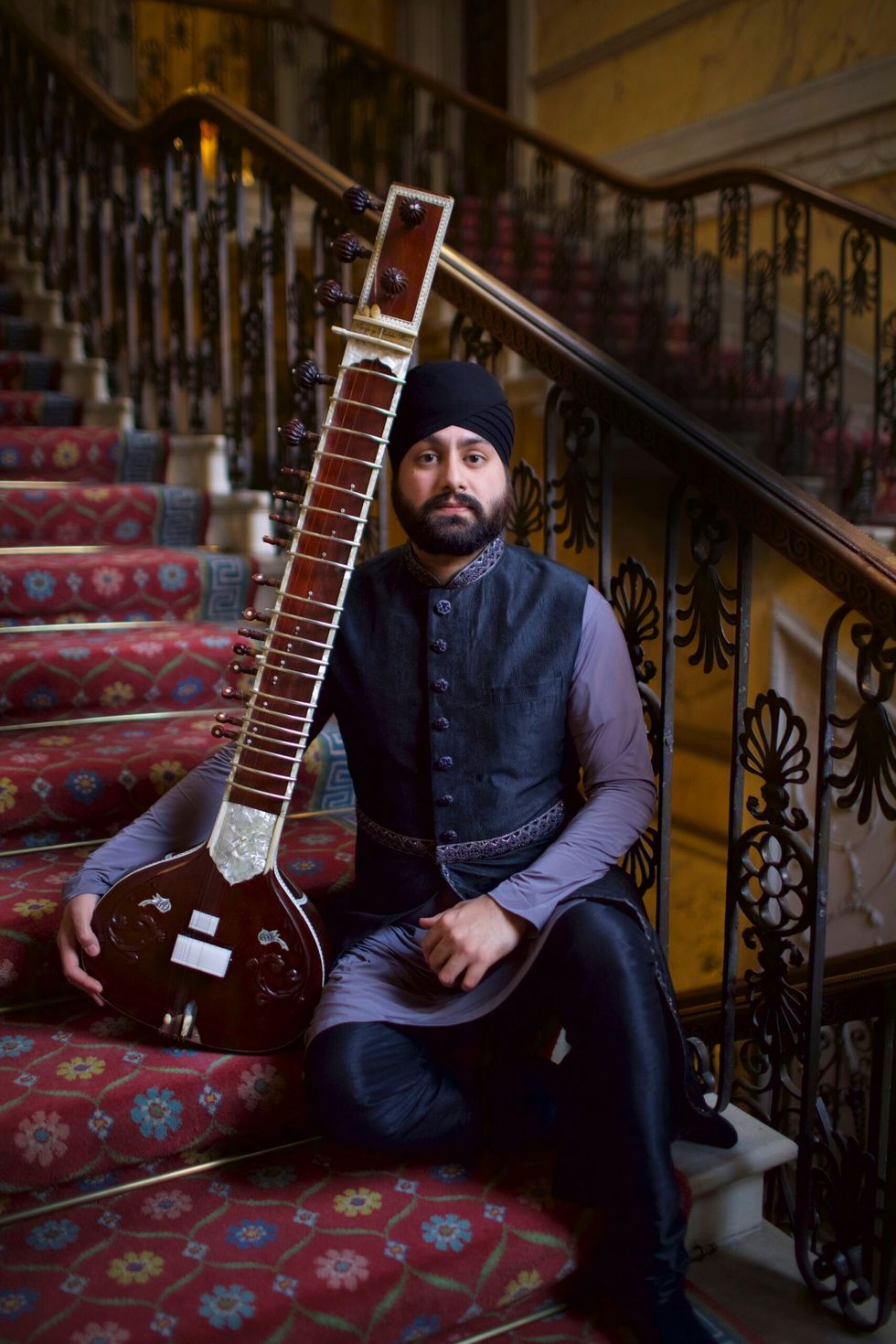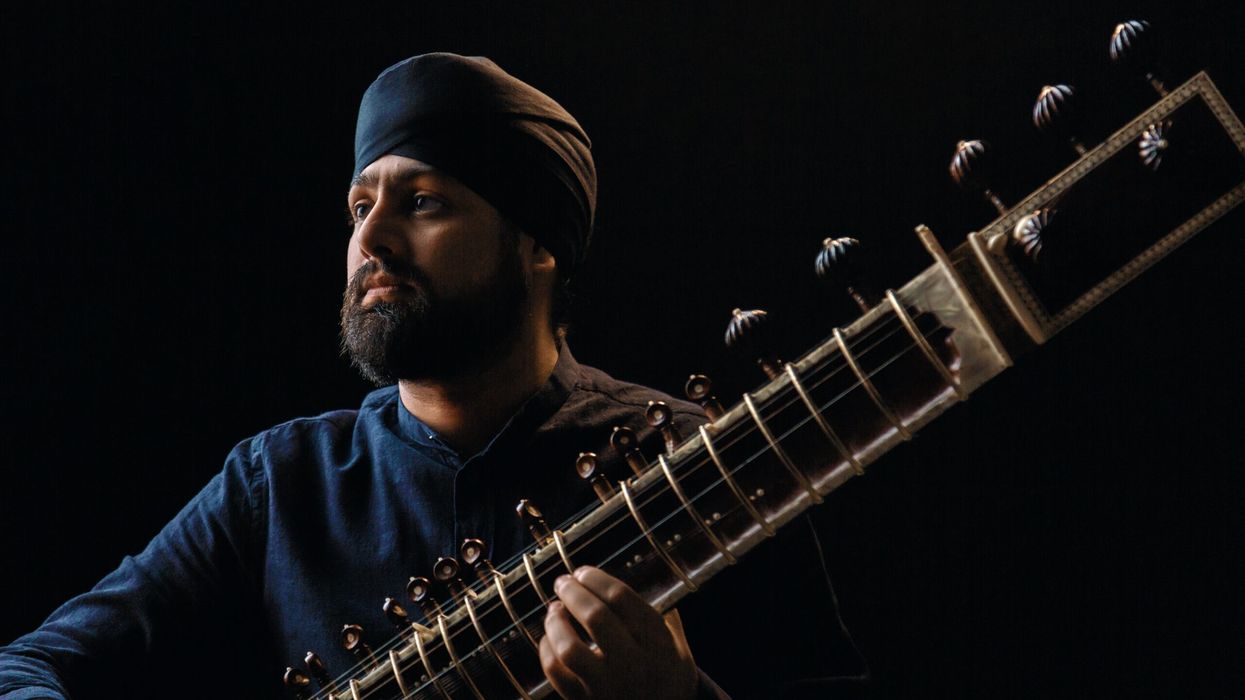BRILLIANT British talent Jasdeep Singh Degun has been flying the flag for classical Indian music with world-class live performances, an acclaimed album, and global collaborations.
The young sitar maestro has broken down boundaries with his artistry and new approach to composition without losing touch with his cultural roots.
His impressive achievements in a short span of time also include composing for the innovative opera Orpheus and winning multiple honours, including the prestigious Songlines best newcomer award for 2023.
He has also worked with the leading music lights, Guy Chambers, Cerys Matthews, Melanie C and Vangelis. That momentum will continue with another album and forthcoming live performances.
Eastern Eye caught up with the fastrising star to talk about his actionpacked journey so far, the Songlines award, music, future plans and using creativity to breakdown cultural barriers.
How do you reflect on your eventful music odyssey so far?
The last couple of years have been pretty busy, with one thing after another. I haven’t really had a chance to sit and reflect on it all, as it has been a total whirlwind. I feel very blessed and privileged to have a rich and busy musical life. I am very thankful to my teacher, Ustad Dharambir Singh, and the army of musicians, artists and organisations who have helped and contributed to my adventure in music till now.
What has been your most memorable creative moment?
Recently, it has been composing and codirecting the music for the opera Orpheus, commissioned by Opera North and South Asian Arts-UK. Orpheus was a ground-breaking production that brought together Indian classical and western baroque styles of music. There was a lot of pressure on me to deliver a culturally sensitive and meaningful collaboration between both styles. It was one of the most difficult projects I’ve ever undertaken, but easily the most remarkable and rewarding.
How much does the Songlines best newcomer 2023 award mean to you?
It was pretty amazing to receive the Songlines best newcomer award. I have followed Songlines for a long time, and a lot of friends, colleagues and people who I look up to have received Songlines awards in the past. To be recognised and supported by Songlines is really brilliant. I am so very happy.
Are you hoping this award draws more attention to Indian classical music?
Yes, for sure. I am always hoping to raise the profile and reach of Indian classical music. I hope this recognition opens doors for other musicians like me.

Do people sometimes tend to overlook how much great Indian classical music is being produced by British artists?
Definitely. There are loads of great Indian classical musicians based in the UK such as Pt Sanju Sahai, Roopa Panesar, Kaviraj Singh, Soumik Datta, Kirpal Panesar and Shabhaz Hussain, to name a few. Please do look them up and check out their work.
You have been very unorthodox with the projects that you have done so far. Has that been a conscious decision?
No, not necessarily. First and foremost, I am a classically trained Indian musician. So, all my work has links to Indian classical music - it is at the core of everything I do. I also enjoy working with artists from other genres. Being born and brought up in the UK, with access to so many amazing musicians in different fields, has led me to do work that isn’t so typical for an Indian classical musician. But while I do that, my goal has always been to maintain integrity and respect for the Indian classical music tradition.
What can we expect next from you?
Following on from my debut album, Anomaly (released on Real World Records), I am about to start work on my next contemporary album. I am also continuing to perform across the country. I just performed at King’s Place, London, with the wonderful Scottish Ensemble and I’m doing a classical concert at the Crucible Theatre in Sheffield on January 30. My next concert is at Cambridge Music Festival on March 7. You can find more details on my official website (www.jasdeepsinghdegun.com).
Do you think that Indian classical music needs to be combined with other elements and commercial genres in order for it to have a wider reach?
No, not necessarily. Some of our greatest musicians perform Indian classical music in a very pure and traditional way. Artists such as Kaushiki Chakraborty, Ustad Zakir Hussain, Ustad Shahid Parvez and Ustad Rashid Khan are some musicians who have championed the performance of music in a classical manner. That is not to say these musicians don’t engage with and perform more contemporary work; they do. But I don’t feel Indian classical music has to be combined with other genres to get that reach. Indian classical music has a pull and power of its own that doesn’t need to be dictated by commercial considerations; it transcends all that.
Would you agree that you are using music and creativity to break down cultural barriers?
I feel that the work I do naturally results in cultural barriers being broken down, but it is not something I actively seek out. I enjoy finding ways of working with musicians from different genres and backgrounds while maintaining my love and passion for Indian classical music. I think that this passion shines through all of my projects and musical endeavours.
You have done some interesting collaborations. Is there someone in particular who you would love to work with?
I am a big fan of composer Max Richter and to collaborate with him would be a dream come true.
What music is currently dominating your playlist?
Abi Sampa and Rushil’s Orchestral Qawwali Project. They are great.
What does music mean to you today?
That is a tough question. I feel that music has meant different things to me at different times in my life. Today, I would say I am still in awe of how music has the power to move people.













